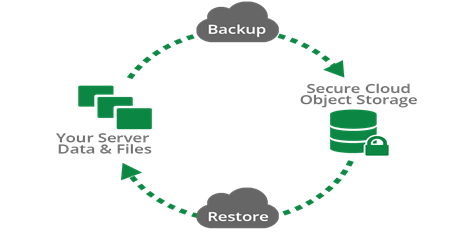Here’s Everything You Need to Know About Cloud Backups
Cloud backups have been in use for many years now and are being used widely by many organizations all over the world. This is because they offer many benefits in the shape of a low-cost option for businesses.
Implementing cloud data backup can help bolster a business’s data protection strategy without increasing any workload of the IT staff. The labor-saving may alone be a reason for many businesses to switch to the cloud but this is just one of the many advantages of cloud backups and in this article, we will dive into more benefits along with everything you need to know about cloud backups.
Here’s Everything You Need to Know About Cloud Backups
What is Cloud Backup?

Before we jump right straight to the benefits of cloud backups, it is best to start with the basics. Cloud backup is basically a strategy for sending a copy of a physical or virtual data or entire database to a secondary off-site location for the preservation of data so that it can be recovered in case of any data loss event such as natural disaster, ransomware, hardware failure or even human error.
The secondary server and the data storage systems are hosted by a third-party vendor who charges the user a monthly or yearly fee based on the storage space and the services in use.
How Cloud Backup Works?

Cloud backups work by backing up data and storing it on different storage media or another storage system off-site for easy access in case data recovery is needed.
Cloud Backup Steps
- Data is designated for backup which may include new or updated data.
- The backed-up data files are then encrypted and sent off site to the cloud.
- Businesses can choose between private cloud, public cloud or cloud-to-cloud backup methods.
- Files can be easily accessed are readily available for recovery when needed.
How Data is Restored?
Cloud backup services offered by vendors are typically built around a client software application that runs on a schedule determined by the user’s needs and requirements. For instance, if the user wants daily backups, data is collected, compressed, encrypted and transferred to the cloud service provider’s servers every 24 hours. If the user wants weekly or monthly backups then all this is done according to the schedule that is selected.
To reduce the amount of bandwidth consumed and the time it takes to transfer files, the cloud service provider might only provide incremental backups after the initial full backup. However, this depends on vendor to vendor.
Speaking of vendors, some vendors like StoneFly, offer cloud backup and recovery software solutions that are easy to use and help users back up their data and monitor their data backup strategy by setting schedules through a simple-to-understand user interface.
Types of Data Backups
Full Data Backups
Full data backups copy the entire data set every time a backup is initiated. As a result, full data backup provides the highest level of protection as everything is backed up. However, most organizations cannot perform full backups frequently because they can be very time-consuming and take up too much data storage capacity.
Incremental Data Backups
Incremental data backups only back up the data that has been changed overtime or updated since the last backup was made. This method saves time and storage space; however, it can make it more difficult to perform a complete restore. Incremental data backups are the most common form of cloud backup because they tend to use fewer resources as compared to full data backups.
Differential Data Backups
Differential data backups are similar to incremental data backups in some ways because they only back up data that has been altered. Having said that, differential backups only back up the data that has been changed since the last full backup was made. So, as a result, this method solves the problem of difficult restores that can arise with incremental backups.
Benefits of Cloud Backups
- Cloud backup solutions are relatively a lot cheaper than most backup appliances or a solution that requires building and maintaining an on-premises backup operation. In time, the associated backup costs would arise but it is easier to upgrade to cloud storage than to backup appliances (although they have their own advantages). Generally, this is more beneficial for smaller businesses with limited budgets.
- Cloud backup solutions are easily scalable. This is really beneficial as the business is at ease if their data grows. Their data can be easily backed up by scaling up to more cloud backup storage space whenever needed.
- Managing a cloud backup solution is a lot easier and simpler because cloud service providers take care of many of the management tasks. Also, with easy management, GUI offered by some vendors such as StoneFly, managing backups, and scheduling tasks becomes a lot easy.
- Cloud backups are generally more secure against ransomware attacks because data is stored outside the network of the business. Data is also encrypted before it is transmitted to the cloud backup service so it is a lot harder to hack it.
- Cloud backups are usually automated which means that there is no need for any manual backup process or schedule. Businesses can set up schedules and data can be automated backed up when a change is made or when it reaches the scheduled time.
- All the data that has been backed up is available from anywhere and at any time, provided the right credentials are used to access it.
- Cloud backups can significantly lower the risk of common data backup failure that can be caused by improper storage, physical media damage, and accidents.
- Cloud backup service can help consolidate the organization’s backup data because it can back up main data center storage systems, storage devices, remote office servers, and also end-user devices like laptops and tablets.
Conclusion
This blog explained everything you need to know about cloud backups. Cloud backups offer many benefits to the businesses and organizations that use it and are cost-effective, reliable, and are a go-to solution for many businesses. So, it only makes sense to get a cloud backup solution for your business as well.


















Hey I know this is off topic but I was wondering if you knew of any widgets I
could add to my blog that automatically tweet my newest twitter updates.
I’ve been looking for a plug-in like this for quite some time and was hoping maybe you would have some experience with
something like this. Please let me know if you run into anything.
I truly enjoy reading your blog and I look forward to
your new updates.